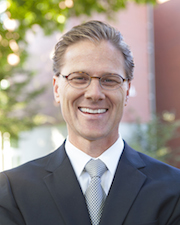Questioning the Calculations |
College Promise Programs | Donate! 


What’s AHEAD Commentary [Poll 9]
To join the discussion on these commentaries, please visit our Facebook page:
https://www.facebook.com/PennAHEAD
What Presidential Candidates Need to Know
About Promoting College Student Success
In our ninth What’s AHEAD poll, we focused on what the presidential candidates and federal policymakers should know about improving college student success. We invited three Penn GSE alumni, all leading scholar-practitioners, to comment: Dr. Ellie Fogarty, Middle States Commission on Higher Education, Dr. Ronald Jackson, Brooklyn College, and Dr. Daniel Martin, Seattle Pacific University.
End Childhood Poverty
 Ellie A. Fogarty
Ellie A. Fogarty
Vice President
Middle States Commission on Higher Education
No one federal policy, including “free community college,” will be the silver bullet that promotes college student success. Students do not begin to succeed, nor do they begin to fail, upon admission or entry into college. Everything that happens before they get to college positions entering students for success or failure. Colleges and universities already wrap struggling students in a patchwork quilt of publicly- or philanthropically-funded and institutionally-supported programs to make up for gaps of one sort or another in a student’s background. Some of the patches overlap and cover certain student populations well; others are threadbare and in need of mending. Sadly, most of these programs have little to do with providing quality higher education and everything to do with addressing social disparities sometimes 18, 20, or 40 years later.
Instead of instituting additional federal policies aimed at higher education, I implore presidential candidates to focus on the urgent need to end childhood poverty. In my view, the successful candidate will work closely with Congress on national policies for housing, health care, early childhood education, food programs, and childcare. Madam or Mister President-elect: End childhood poverty. It will be our honor and privilege to offer these future students the best higher education opportunities in the world.
The Evolution of Student Success
 Ronald C. Jackson
Ronald C. Jackson
Dean of Students
Brooklyn College
As students demand increased diversity, safer environments, and low tuition, a new president must understand the lives of these students and the complex issues they face on today’s college campuses. College campuses are no longer safe havens where hard work and intellectual curiosity lead to social and economic advancement. Managing the daily woes of college life can be a deterrent to success for students who are unprepared to handle it. Regardless of institution type, every student desires to graduate and obtain employment, and each institution should be held accountable to ensure that admitted students are afforded equitable opportunities to do so.
Higher education is said to promote a more educated and advanced citizenry. Thus, the president, who holds responsibility for the nation, must ensure that this holds true. Yet, the attention should not fall solely on higher education. Preparation for college should not start at orientation, but well before the college application process begins. Thus, attention must also be paid to the K-12 system to help students to be prepared, not only academically, but also mentally and financially. A new president must see education as a continual pipeline from K-16 and encourage increased collaboration by all educational sectors to improve student success.
Difference Without Dissonance: Measuring Student Success
 Daniel J. Martin
Daniel J. Martin
President
Seattle Pacific University
The timing for this poll is appropriate, considering the 2016 presidential candidates have given very different glimpses into their views on higher education. Each academic leader will likely have an interesting and different insight into the results of the poll conducted by AHEAD. For my opinion, I will focus on the results of the report’s first two figures, as I believe they reveal the crux of the problem for public officials to understand higher education.
Viewed in succession, these figures reveal that although academic leaders affirm the value of measuring outcomes and show that our academic endeavor is making an impact, a one-size-fits-all rating system does not do justice to the outcomes we are pursuing.
The first figure illustrates strong support for using outcomes by those in leadership. Academic leaders are not afraid of measuring the results they are seeking for their students. Yet, the results that we are measuring may be quite different from one institution to the next. In contrast, the idea of introducing a rating system that attempts to measure every institution by the same standard finds significant disagreement. That shouldn’t come as a surprise to those of us in higher education, but to the general public, or to our presidential candidates, it is important to note why this is a concern.
As the president of a faith-based institution, I would argue that our mission is slightly different from some of our peer institutions—a distinction hopefully recognized and valued by the presidential candidates. For comparison, I would liken universities to hospitals; there is variety in the hospitals in the U.S. that helps us serve our population. Some hospitals are known for their excellence in certain treatments and specialties while others serve a very specific region or neighborhood. However, all of them play a role in caring for the needs of our citizenry. Likewise, although each university provides an education, some may put their focus on specific societal needs and serve very different student populations and communities.
What this poll revealed is that we hope presidential candidates would recognize the need for higher education to serve specific needs, and that such differences would necessitate varied ways to assess mission effectiveness. Given this, it is unlikely that a national rating system would recognize the unique ways each college or university is contributing to society and the good of our country.
To join the discussion on these commentaries, please visit our Facebook page: https://www.facebook.com/PennAHEAD



